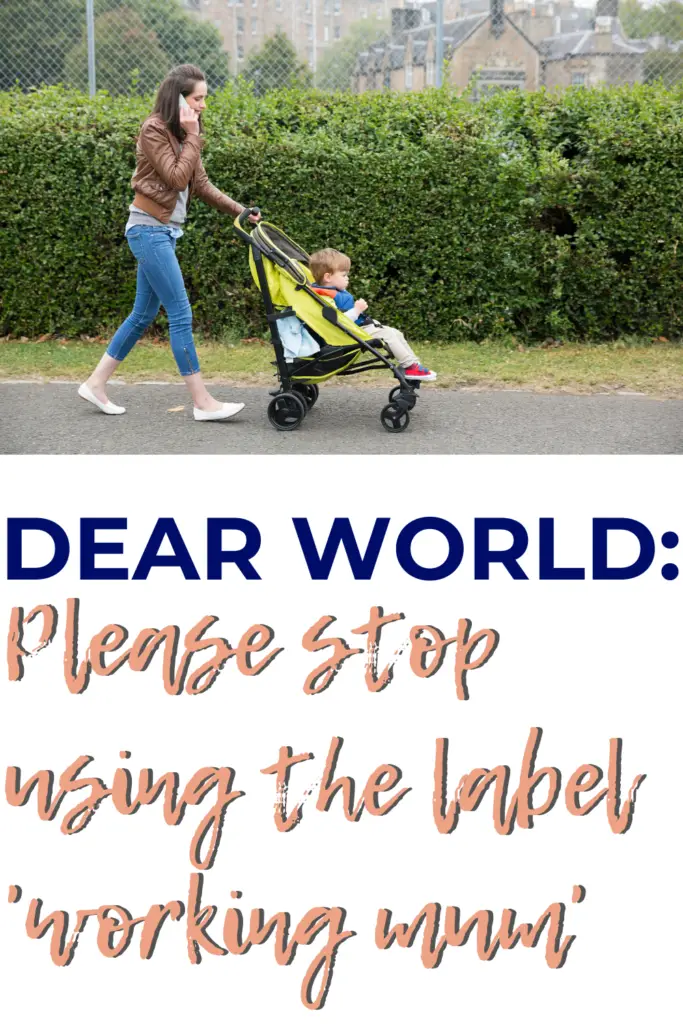I use affiliate links in some blog posts. If you click through and make a purchase, I earn a small commission at no extra cost to yourself. Thank you for your support.
For years, women who work outside the home have protested against the label ‘full-time mum’ being used for a woman who stays home to look after her children.
And rightly so. If a child has an accident at school, that mum will likely have to leave work to attend to the emergency – because she is, after all, a ‘full-time mum’.
But it’s time for us all to wake up to another piece of discriminatory language – the label of ‘working mum’.
This label is almost always used to describe a woman who works outside the home – but, since 2009, I have been a ‘working mum’ to my children and I haven’t worked outside of the home. Instead, I have worked within the home, meeting the needs of my children and sorting out the lion’s share of the housework and general admin, which a family creates.
Am I a working mum? By heck I am.

So if all mums work, why do people need to add this label?
Because, although I know that no-one is saying my job is easy, neither is anyone saying that it can be as busy, full, unrelenting and inflexible as a paid job – and therefore they hesitate to call me a ‘working’ mum. Quite simply, our definition of ‘work’ is too narrow.
And people make inaccurate assumptions. One is that you have nothing to do; your life consists of sitting around watching daytime telly, or sauntering into town with your kid strapped into the buggy, having coffee with friends and spending this week’s child benefit at Primark.
A second assumption is that if you’re able to be at home with your kids, you’re somehow living a life of luxury, made possible only by a partner who earns an enormous salary.
It’s time we were kinder to each other. It’s time we broadened our definition of ‘work’.
Of course there will be some truth to each of these assumptions, in that everyone’s situation is different and everyone’s parenting style is unique to them. Naturally, real people do exist who fall into the above categories, and I’m not here to judge them.
But in nearly a decade of parenting, I’ve met hundreds of parents, and the vast majority of those who care for their kids at home do not fall into these stereotypes.
First, they are totally and utterly devoted to their kids, and their week is filled with toddler groups and classes for the benefit of their child. There’s not much time for telly or shopping between meals, groups, naps and school-runs – and they get caught out by ‘fun’ school projects to build the Tower of London from lolly sticks by tomorrow just as much as a parent who works outside the home.
Second, they often have to budget tightly in order to make ends meet. My husband and I don’t own a home, we drive one second-hand car between us, and have little disposable income for sprucing up our home (or ourselves, for that matter).
And, ironically, they often find themselves doing ‘that bit extra’ because they’re not working outside of the home. In my nine years of apparently ‘not working’, I’ve set up the school PTA, served on governing body, volunteered for a local charity, and helped run toddler groups, amongst other commitments.
So raising your kids at home becomes more than a full-time job, where you’re trying to cram not only housework and family admin into the hours when your child sleeps, but running meetings, sending emails, writing rotas, contacting sponsors – often past midnight.
When are we going to wake up and realise that all mums work?
Also, forgive me for stating the obvious, but it’s not the 1950s. Why should we be so surprised at women working outside the home that we feel the need to coin it in a phrase? No one talks about ‘working dads’ – they are just assumed to be working outside the home, even if they are working inside the home caring for their children. (In which case they are still ‘working dads’, so the label is still useless.)
The phrase is not only an insult to mums who work within the home, but an outlandishly sexist label for those who work outside the home, as if they are somehow doing something daring and naughty.
This is a plea – to everyone who has ever used the word ‘working mum’ to describe someone who is not me. Please don’t.
Please acknowledge the breadth of the word ‘work’. Please remember that we all do it in different ways. Some is paid, some is unpaid. Some is acknowledged, some isn’t (but should be).
Now that we can safely assume every parent works, maybe we can drop the ‘working’ prefix?
Amen! The eight years I spent taking a career break to raise my son definitely involved lots of ‘work’! Busy times!! Now I’ll joke that I go to the office for a rest 🙂 (only half-joking!) x